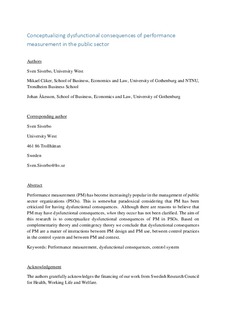| dc.contributor.author | Siverbo, Sven Gunnar | |
| dc.contributor.author | Cäker, Mikael | |
| dc.contributor.author | Åkesson, Johan | |
| dc.date.accessioned | 2019-06-11T06:11:20Z | |
| dc.date.available | 2019-06-11T06:11:20Z | |
| dc.date.created | 2019-06-09T11:55:59Z | |
| dc.date.issued | 2019 | |
| dc.identifier.issn | 1471-9037 | |
| dc.identifier.uri | http://hdl.handle.net/11250/2600397 | |
| dc.description.abstract | Performance measurement (PM) has become increasingly popular in the management of public sector organizations (PSOs). This is somewhat paradoxical considering that PM has been criticized for having dysfunctional consequences. Although there are reasons to believe that PM may have dysfunctional consequences, when they occur has not been clarified. The aim of this research is to conceptualize the dysfunctional consequences of PM in PSOs. Based on complementarity theory and contingency theory we conclude that dysfunctional consequences of PM are a matter of interactions between PM design and PM use, between control practices in the control system and between PM and context. | nb_NO |
| dc.language.iso | eng | nb_NO |
| dc.publisher | Taylor & Francis | nb_NO |
| dc.title | Conceptualizing dysfunctional consequences of performance measurement in the public sector | nb_NO |
| dc.type | Journal article | nb_NO |
| dc.type | Peer reviewed | nb_NO |
| dc.description.version | acceptedVersion | nb_NO |
| dc.source.journal | Public Management Review | nb_NO |
| dc.identifier.doi | 10.1080/14719037.2019.1577906 | |
| dc.identifier.cristin | 1703646 | |
| dc.description.localcode | Locked until 14 March 2020 due to copyright restrictions. This is an Accepted Manuscript of an article published by Taylor & Francis in Public Management Review on 14 March 2019, available at https://doi.org/10.1080/14719037.2019.1577906. | nb_NO |
| cristin.unitcode | 194,60,10,0 | |
| cristin.unitname | NTNU Handelshøyskolen | |
| cristin.ispublished | false | |
| cristin.fulltext | preprint | |
| cristin.qualitycode | 1 | |
